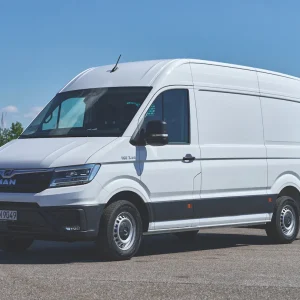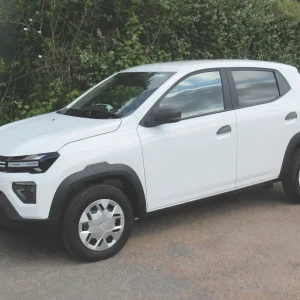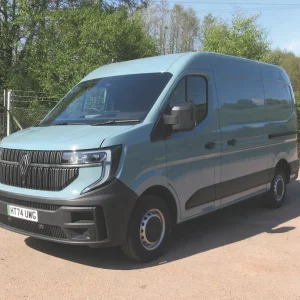Van operators anxious to cut their emissions are in something of a quandary. While the ranges offered by pure battery-electric vehicles are increasing, they are still not sufficient to meet the needs of many business owners who may understandably suffer from range anxiety.
One way of squaring this circle is to opt for a light commercial vehicle equipped with a range extender: one that can run on battery power only on short-haul work in urban areas, but is fitted with a conventional engine that can be called on if the driver has to tackle longer runs.
It is a market Ford is catering for with the PHEV (plug-in hybrid electric vehicle) version of the Transit Custom.
With its PHEV status denoted by a discreet badge on the offside rear door, it comes with an electric motor plus a battery pack that can be recharged using mains electricity. It is backed by a range-extender petrol engine that supports them in the same way that a generator would.
Not directly connected to the vehicle’s driven wheels, it pumps in power once the battery is depleted. It means the van can travel a lot further without the need to plug it into a charging station than the 35 or so miles it can achieve by relying on its battery alone.
The PHEV is an alternative to the standard diesel-fuelled Transit Custom, which has a 2.0-litre Ecoblue engine up for grabs at 105hp, 130hp, 170hp or 185hp.
Mention should also be made of the mHEV mild-hybrid Custom. Offered with the 130hp diesel, it comes with a belt-driven integrated starter/generator (BISG) rather than an alternator plus a 10Ah 48V air-cooled lithium-ion battery that sits under the passenger seat.
The BISG enables the battery to capture and store energy that would otherwise be lost when the van decelerates, and use it to power the Custom’s electrical system, including its electric power steering.
Result? Less effort is required from the engine, and that spells good news for fuel usage.
BISG also uses the energy stored to give the engine a torque boost when the driver accelerates – even better news for fuel economy.
We got to grips with a PHEV in top-of-the-range Limited trim. It can also be ordered with entry-level Leader and mid-range Trend specifications.
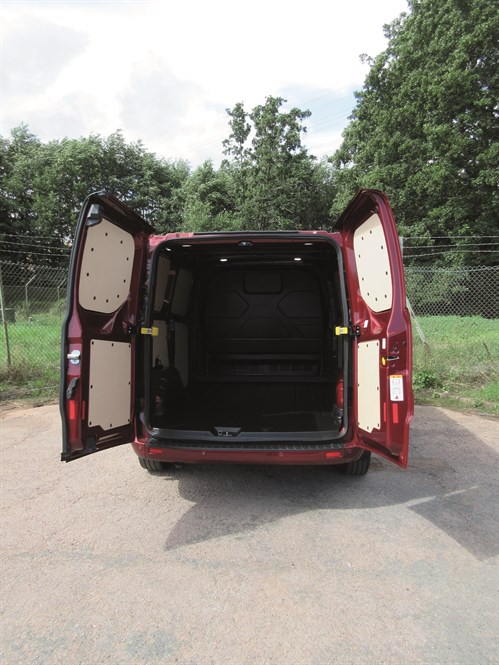
Load bay
The Transit Custom PHEV comes solely in L1/H1 – short-wheelbase, low-roof – configuration.
Entry to the 6.0m3 cargo area is via a sliding nearside door plus twin rear doors, which can be swung through 90°, and through 180° if the chunky, easy-to-release stays are unhooked.
Eight load tie-down points are provided, with a full-height steel bulkhead in place to protect the occupants of the cab should unsecured cargo come hurtling forwards under heavy braking. The load floor is covered by a tailored rubber mat while the sides and doors are partially protected from minor scratches and scrapes by panelling.
There was no protection for the always vulnerable wheel boxes.
Good to see four LED lights, which provide enough illumination to make it easy to load and unload at night.
The weight of the battery pack reduces gross payload by 192kg when compared with the nearest-equivalent diesel model. Bear in mind that Ford does not advise towing a trailer with the Transit Custom PHEV, even though some rival battery-electric models are being offered with towing capability.
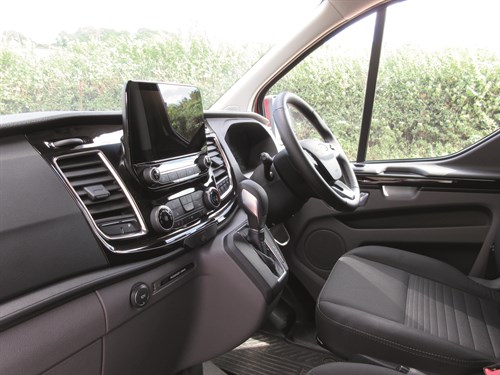
Interior and equipment
Creature comforts in the three-seater cab include heated driver and outboard passenger seats – the centre passenger has to do without – and very effective air conditioning. Aircon is standard on all Transit Custom PHEVs, including Leader.
The dashboard is dominated by an 8in colour touchscreen, which controls a DAB radio, with remote switches on the steering wheel. Ford’s Sync 3 communications and entertainment system is installed, with Bluetooth connectivity and Apple CarPlay and Android Auto compatibility.
Provided too is emergency assist, which can summon help promptly if there is an accident, and a Ford Pass Connect onboard modem. Among other things it allows drivers to monitor their vehicle’s state of charge remotely using a Ford Pass app.
Also worthy of note is the large power/charge gauge, which replaces the rev counter and tells you how efficiently you are driving. Present too is a smaller gauge, which gives you the battery’s state of charge.
Cruise control with a speed limiter is fitted, as is a trip computer. So are electric windows and heated electrically adjustable exterior mirrors, with a lower wide-angle section. The windscreen is heated too.
Storage facilities include two bins – one with a moulding, which can hold a bottle of water – in each of the doors. Cupholders are positioned at either extremity of the dashboard and have a bottle/can holder underneath.
A deep, lidded and lockable glovebox, which can swallow an A4 file, is present, as is a shelf above the windscreen that incorporates a slot for your sunglasses. You will also find a sunglasses holder above the driver’s door.
Four shelves are located on top of the dash, one of which boasts a USB socket and a 12V power point. Another 12V point sits on the passenger side of the fascia next to a second USB socket.
The middle seat is fine for short journeys, despite the lack of shoulder room. Most passengers should hopefully find that their legroom is only marginally compromised, with the moulding that accommodates the gear shift just missing their right knee.
The centre section of the middle seat’s back folds downwards and turns into a desk complete with two cupholders, a pen tray, and an elasticated band to keep paperwork in place.
Beneath the passenger seats you will find a compartment, which in our case played host to the van’s charging cables and a first aid kit complete with gloves and a high-visibility vest. A hatch in the bulkhead enables extra-long items to be pushed into the void, although items such as cables may have to be removed first.
The leather-trimmed steering wheel is height-adjustable, as is the driver’s seat. The angle of the seat cushion can be altered too, and the wheel can be adjusted for reach.
Turning to safety, driver and passenger airbags are installed along with side airbags.
Disc brakes are fitted all round and the Custom PHEV is equipped with ABS, electronic brakeforce distribution, emergency brake assist, electronic stability control and roll stability control.
Also in place are traction control system, which can be switched off, and side wind stabilisation, which is intended to prevent the Custom from being blown into an adjacent lane on the motorway if it is caught in a crosswind.
Enhanced park assist was installed as an option. Designed to help manoeuvre your van into a tight parking slot, it includes front and rear parking sensors. Front fog lamps form part of the deal.
Another option installed was a Visibility Pack, which embraces a reversing camera, power-folding mirrors, and lane keeping alert.
The suspension system employs MacPherson struts with variable-rate coil springs plus an anti-roll bar at the front while leaf springs help support the rear. Gas-pressurised shock absorbers are fitted all round.
Our demonstrator’s 16in alloy wheels were shod with Goodyear Efficient Grip 215/65 R16C tyres. The van comes with a full-size spare wheel.
Delivered by electric power steering, the turning circle is 12.2m wall to wall reducing to 11.6m kerb to kerb.
Side rubbing strips help to protect the van’s sides and (in our case) its optional metallic paint from minor damage. The rubbing strips, bumpers, door handles and mirror casings are all colour-coded so that they match the body’s finish.
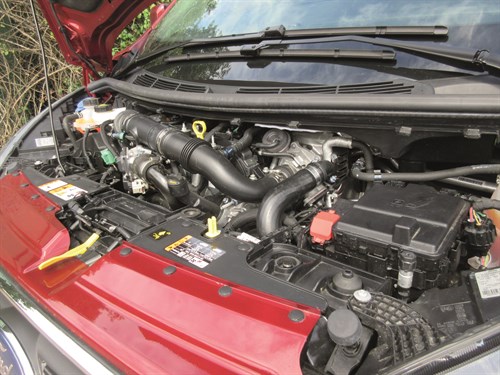
Engine and gearbox
Power is delivered by a 92.9kW electric motor, which drives the front wheels through a single-speed auto gearbox.
With 355Nm of torque on tap, the motor is supported by a 13.6kWh liquid-cooled lithium-ion battery positioned beneath the load floor. Its charging point is concealed by a flap just below the van’s nearside headlight.
Battery and motor are backed by a 1.0-litre Ecoboost petrol engine, which acts as an onboard generator. If the battery becomes depleted then the generator allows the van to keep rolling, enabling the PHEV Transit Custom to achieve a claimed total range of over 310 miles.
Driving
Think about which setting you are going to use before you move off, and deploy the four-position mode switch on the dashboard accordingly.
EV Auto is the default setting. It means you will start off using the battery – artificial noise is generated so that cyclists and pedestrians about to cross the road know you are heading their way – while an algorithm monitors its energy levels.
If necessary it activates the range extender, and will take the sort of work you are on into account before it does so. You may be on a slow stop-start urban run – ideal for a battery-electric vehicle – or you may be tackling a high-speed intercity dash, which means help from the range extender will be essential.
EV Later means you move away on petrol power, allowing you to conserve the charge in the battery so you can revert to it if you are heading into an emissions-sensitive city centre.
Two other settings can be deployed.
Flick to EV Now and you go straight to battery power immediately, while EV Charge uses the engine to recharge the battery while you drive. Use the last-named setting with caution because it means you will burn a lot of petrol.
Geofencing is available, which switches the van to EV Now if you are entering an environmentally sensitive area, such as London’s Ultra Low Emission Zone.
If there is insufficient charge in the battery – i.e. if it is below 60% – then EV Charge will be triggered before the zone is entered to give it a boost. Once the battery is depleted then the Custom PHEV defaults to EV Auto.
The leather-trimmed gear selector is not all that precise, and you can easily find yourself in neutral rather than reverse. Worth exploring, though, is its L mode, which boosts the van’s regeneration system.
Every time you slow down it helps recharge the battery. Its effect is such that in some situations you can use it as a retarder, enabling you to reduce speed without having to touch the brakes.
They suffer less wear as a consequence. The brake lights illuminate to warn drivers following the van that it is losing speed.
With all the torque availability instantly, a Custom PHEV in EV Auto mode will rocket away from rest the minute you touch the loud pedal. Acceleration slows markedly after the initial rush, however, and performance becomes more far pedestrian as the petrol engine kicks in.
Run on battery power and the van wafts along silently. That changes markedly as soon the petrol engine fires up. And it can be noisy.
Something that cannot be criticised, though, is the handling: it is exemplary and could hardly be bettered.
Adequate rather than outstanding, the ride is nowhere near as impressive, especially when the van is empty.
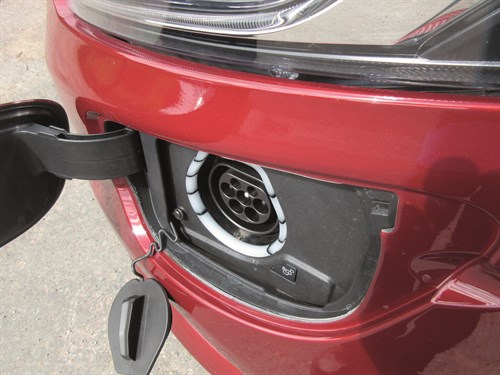
Operating
Service intervals are set at two years/18,000 miles with an annual inspection recommended. The Custom PHEV is covered by a three-year/100,000-mile warranty, with the battery warranted for eight years/100,000 miles.
Ford quotes an official fuel consumption figure of almost 92mpg, but that should be treated with a good deal of caution.
You should do considerably better if you are on short-haul local work, rely on the battery and keep it charged up from the mains, but will do considerably worse on long runs when you have to depend on the petrol generator. That can reduce the figure to closer to 44mpg.
One of the potential problems with plug-in hybrids is the risk that they will never be plugged in, and that the engine will become the sole source of charge for the battery. That means there will be no zero-emission running, which defeats the object of the exercise.
You can recharge the battery in about 4.3 hours if you plug your van into a 240V 10A domestic power socket, says Ford. If you have access to a commercial Type-2 AC charger then it should take no more than around 2.7 hours, it adds.
The van looks expensive compared with its diesel counterparts. Admittedly, it qualifies for the government’s Plug-in Van Grant of up to £8,000, but all this does in effect is wipe out the VAT, and registered businesses can reclaim VAT anyway. All the prices What Van? quotes in its road tests exclude VAT.
Ford Transit Custom Limited 1.0-litre EcoBoost PHEV
Price (ex VAT) £43,925
Price range (ex VAT) £23,040-£43,925
Gross payload 1,165kg
Load length 2,554mm
Load width (min/max) 1,351/1,775mm
Load bay height 1,406mm
Load volume 6.0m3
Loading height 564mm
Rear door aperture 1,404 x 1,347mm
Side door aperture 1,030 x 1,324mm
Gross vehicle weight 3,400kg
Braked trailer towing weight n/a
Residual value 23.1%*
Cost per mile 51.4p (inc PiVG)*
Engine size/power 92.9kW electric motor/1.0-litre EcoBoost petrol range extender
Torque 355Nm
Gearbox 1-spd
Fuel economy 91.7mpg
Battery 13.6kWh lithium-ion
CO2 60g/km
Warranty 3yrs/100,000mls
Service intervals 2yrs/18,000mls
Insurance group tbc
Price as tested £45,425
* after 4yrs/80,000 miles
source: KwikCarcost
Options
Metallic paint £650
Enhanced Park Assist £300
Visibility Pack – Premium £550
Rivals
Citroen Dispatch
Price (ex VAT) £23,645-£42,380
Load volume 4.6-6.1m3
Gross payload 960-1,469kg
Engines 100hp 1.5 diesel, 120hp, 150hp, 180hp 2.0 diesel, 100kW battery-electric
Verdict: The big Dispatch news is the arrival of an EV model with a claimed range of up to 211 miles depending on the battery pack you pick. The Dispatch is also sold through Peugeot dealers as the Expert and by Vauxhall dealers as the Vivaro, and they too are produced in battery-electric guise. Toyota’s Proace shares the same platform and overall design, and an electric model is in the pipeline.
Renault Trafic
Price (ex VAT) £24,150-£35,400
Load volume 5.2-8.6m3
Gross payload 1,036-1,255kg
Engines 120hp, 145hp, 170hp diesel
Verdict: Subjected to an extensive revamp recently, with new engines plus the Efficient Dual Clutch gearbox offered for the first time, the Trafic is a useful workhorse. But it lacks some of the more sophisticated safety systems offered on some of its key rivals; a lack Renault needs to address. Nor is it marketed in battery-electric or plug-in hybrid guise. The Trafic is also sold by partner brand Nissan as the NV300 and by Fiat Professional as the Talento.
VW Transporter
Price (ex VAT) £22,115-£49,290
Load volume 5.8-9.3m3
Gross payload 713-1,309kg
Engines 90hp, 110hp, 150hp, 199hp 2.0 diesel, 83kW battery-electric
Verdict: The Transporter is the gold standard for second-hand values, and it’s not hard to see why. VW’s build quality can scarcely be bettered, and the van’s safety standards are very high. Strong engines and a slick gear-change, and the arrival of a battery-electric van produced with ABT completes a largely positive picture. Interior and exterior styling are lacklustre though.
The Final Verdict
Design 7/10 – Needs two power sources to offer best of both worlds, which becomes pricey
Cabin 8/10 – A well-equipped, comfortable working environment
Ride 6/10 – Not as impressive as we’ve experienced in the past, especially when unladen
Refinement 6/10 – Quiet on battery power, but can get noisy when you bring in the petrol engine
Load area 8/10 – Low loading height. Bulkhead should protect occupants from shifting loads
Handling/performance 7/10 – Former we cannot praise highly enough; latter inadequate for long-haul work
Engine/transmission 7/10 – Clever, complex package may raise concerns about long-term dependability
Standard equipment 8/10 – Limited trim gives you a decent selection of goodies
Operating costs 7/10 – Acquisition price is on the steep side, but running costs can be low
What Van? subjective rating 7/10 – Stop-gap until pure battery-electrics of its size with matching range come
Overall Rating: 71/100

